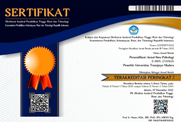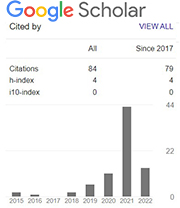Bahasa Cinta Perempuan : Penelitian Fenomenologik Hal yang Membuat Istri Merasa Dicintai
Abstract
Penelitian ini bertujuan untuk menemukan hal apa yang paling membuat seorang istri merasa dicintai, terinspirasi dari teori Five Love Languages Chapman (2010). Peneliti melibatkan 50 subyek perempuan yang telah menikah dengan menggunakan metode kualitatif fenomenologik. Hasil dari penelitian ini, peneliti menemukan lima hal yang membuat istri merasa dicintai. Kelima bahasa cinta istri temuan dari penelitian ini adalah: Communication, Receiving Gift, Family Time, Acts of Service serta Karakter dan Temperamen. Selain lima temuan ini, peneliti juga menemukan satu tema pokok diluar bahasa cinta istri yaitu Uncategorized. Dari lima temuan peneliti, tiga diantaranya merupakan bahasa cinta khas dari istri di Indonesia diluar teori Chapman yaitu Communication, Family Time serta Karakter dan Temperamen. Temuan ini akan membawa dampak bagi penelitian selanjutnya dalam memahami bahasa cinta pada konteks Indonesia.
Keywords
Full Text:
PDF (Bahasa Indonesia)References
Avianti, H. P., & Hendrati, F. (2011). Pengaruh keterbukaan komunikasi mengenai hubungan seksual terhadap kepuasan seksual. Jurnal Psikologi, 6(2), 453-464.
Bachri, B. S. (2010). Meyakinkan validitas melalui triangulasi pada penelitian kualitatif. Jurnal Teknologi dan Bisnis, 10(1), 46-62.
Bowen, G. A. (2008). Naturalistic inquiry and the saturation concept: a research note. Qualitative research, 8(1), 137-152.
Budiasih, G. A. N. (2014). Metode grounded theorydalam riset kualitatif. Jurnal Ilmiah Akuntansi dan Bisnis, 9(1), 19-27.
Chapman, G. (2010). The five love languages for men: Tools for making a good relationship great. Chicago: Northfield Publishing.
Chapman, G. (2010). The five love languages: The secret to love that lasts. Chicago: Northfield Publishing.
Chauhan, P. H., Leeming, D., & King, N. (2020). A hermeneutic phenomenological exploration of feeling joyful. The Journal of Positive Psychology, 15(1), 99-106, https://doi.org/10.1080/17439760.2019.1690670
Chen, J. Y., & Lim, S. (2012). Factors impacting marital satisfaction among urban mainland Chinese women: a qualitative study. Asia Pacific Journal of Counselling and Psychotherapy, 3(2), 149-160.
Claxton, A., O’Rourke, N., Smith, J. Z., & DeLongis, A. (2012). Personality traits and marital satisfaction within enduring relationships: An intra-couple discrepancy approach. Journal of Social and Personal Relationships, 29(3), 375-396.doi:https://doi.org/10.1177/0265407511431183.
Cook, M. Pasley, J., Pellarin, E., Medow, K., Baltz, M., & Buhman-Wiggs, A. (2013). Construct validation of the five love languages. Journal of Psychological Inquiry, 18(2), 50-61.
Dewi, E.M.P., & Basti. (2008). Konflik perkawinan dan model penyelesaian konflik suami istri yang tinggal bersama dan yang tinggal terpisah. Jurnal Psikologi, 2(1), 42-51.
Dewi, K. S., & Widayanti, C. G. (2011). Gambaran makna keluarga ditinjau dari status mereka di dalam keluarga (anak dan orangtua), usia, tingkat pendidikan, dan jenis pekerjaan (studi pendahuluan). Jurnal Psikologi Undip. 10(2), 163-172.
Egan, T. M. (2002). Grounded theory research and theory building. Sage Journals, 4(3), 277-295.
Egbert, N., & Polk, D. (2006). Speaking the language of relational maintenance : a validity test of Chapman’s (1992) five love languages. Communication Research Reports, 23(1), 19-26.
Egbert, N., & Polk, D. (2013). Speaking the language of love: on the whether Chapman’s (1992) claim’s stand up to empirical testing. The Open Communication Journal. 7, 1-11.
Heath, H., & Cowley, S. (2004). Developing a grounded theory approach: a comparison of Glaser and Strauss. International journal of nursing studies, 41(2), 141-150.
Hidayat, S. (2014). Pendekatan face negotation theory dan public relations multiculturalism negara jerman-china dan indonesia. Jurnal ASPIKOM.2(2), 115 – 126.
Himpunan Psikologi Indonesia. (2010). Kode etik psikologi Indonesia. Jakarta: Pengurus Pusat Himpunan Psikologi Indonesia.Hussein, M. E., Hirst, S., Salyers, V., & Osuji, J. (2014). Using grounded theory as a method of inquiry: Advantages and disadvantages. The Qualitative Report, 19(27), 1-15.
Javanmard, G. H., & Garegozlo, R. M. (2013). The study of relationship between marital satisfaction and personality characteristics in Iranian families. Procedia-social and behavioral sciences, 84, 396-399.
Kashima, Y. (2000). Consceptions of culture and person for psychology. Journal of Cross-Cultural Psychology. 31(1), 14-32.
Levitt, H. M., Bamberg, M., Creswell, J. W., Frost, D. M., Josselson, R., & Suárez-Orozco, C. (2018). Journal article reporting standards for qualitative primary, qualitative meta-analytic, and mixed methods research in psychology: The APA Publications and Communications Board task force report. American Psychologist, 73(1), 26-46. doi: http://dx.doi.org/10.1037/amp0000151.
Odle-Dusseau, H. N., Britt, T. W., & Bobko, P. (2012). Work–family balance, well-being, and organizational outcomes: Investigating actual versus desired work/family time discrepancies. Journal of Business and Psychology, 27(3), 331-343.doi: https://doi.org/10.1007/s10869-011-9246-1.
Surijah, E. A., Putri, D. A., Waruwu, D., Aryanata, N. T. (2018). Studi psikologi indigenous konsep bahasa cinta. Intuisi: Jurnal Psikologi Ilmiah, 10(2), 102-122.
Rachmawati, I. N. (2007). Pengumpulan data dalam penelitian kualitatif. Jurnal Keperawatan Indonesia, 11(1), 35-40.
Rao, T. S. S., & Indla, V. (2010). Work, family or personal life: Why not all three? Indian Journal of Psychiatry, 52(4), 295–297. doi: http://doi.org/10.4103/0019-5545.74301.
Rosenbaum, D., More, A. E., & Steane, P. (2016). Applying grounded theory to investigating change management in the nonprofit sector. SAGE Open, 6(4), 1-11.
Sarker, S., Lau, F., & Sahay, S. (2000). Using an adapted grounded theory approach for inductive theory building about virtual team development. ACM SIGMIS Database: The DATABASE for Advances in Information Systems, 32(1), 38-56.
Setyowati. (2010). Grounded theory sebagai pilihan metode riset kualitatif keperawatan. Jurnal Keperawatan Indonesia,13(2), 119-123.
Somantri, G. R. (2005). Memahami metode kualitatif. Makara Sosial Humaniora, 9(2), 57-65.
Surijah, E. A., Ratih, S. K. A., & Anggara, I. M. F. (2017). Merasa dicintai saat dibantu : penelitian survey deskriptip “five love languages”.Psikodimensia, 16(1), 49-61.
Surijah, E. A. & Septiarly, Y. L. (2016). Construct validation of five love languages. Anima Indonesian Psychological Journal, 31(2), 65-76.
Srisusanti, S. &Zulkaida, A. (2013). Studi deskriptif mengenai factor-faktor yang mempengaruhi kepuasan perkawinan pada istri. UG Jurnal, 7(6), 8-12.
Whardono, V. J. W. (2011). Penelitian grounded theory, apakah itu.?. Bina Ekonomi Majalah llmiah Fakultas Ekonomi Unpar, 15(1), 23-35.
Wiley, A. R. (2007). Connecting as a couple: Communication skills for healthy relationship. The Forum for Family and Consumer Issues, 12(1), 1-9.
Yu, R., Branje, S., Keijsers, L., & Meeus, W. H. (2014). Personality effects on romantic relationship quality through friendship quality: A ten-year longitudinal study in youths. PloS one, 9(9). doi: https://doi.org/10.1371/journal.pone.0102078
DOI: https://doi.org/10.21107/personifikasi.v11i1.7291
Refbacks
- There are currently no refbacks.
Copyright (c) 2020 I Made Yudi Permana, Edwin Adrianta Surijah, Nyoman Trisna Aryanata

This work is licensed under a Creative Commons Attribution 4.0 International License.


Personifikasi by Universitas Trunojoyo Madura is licensed under a Creative Commons Attribution 4.0 International License.










